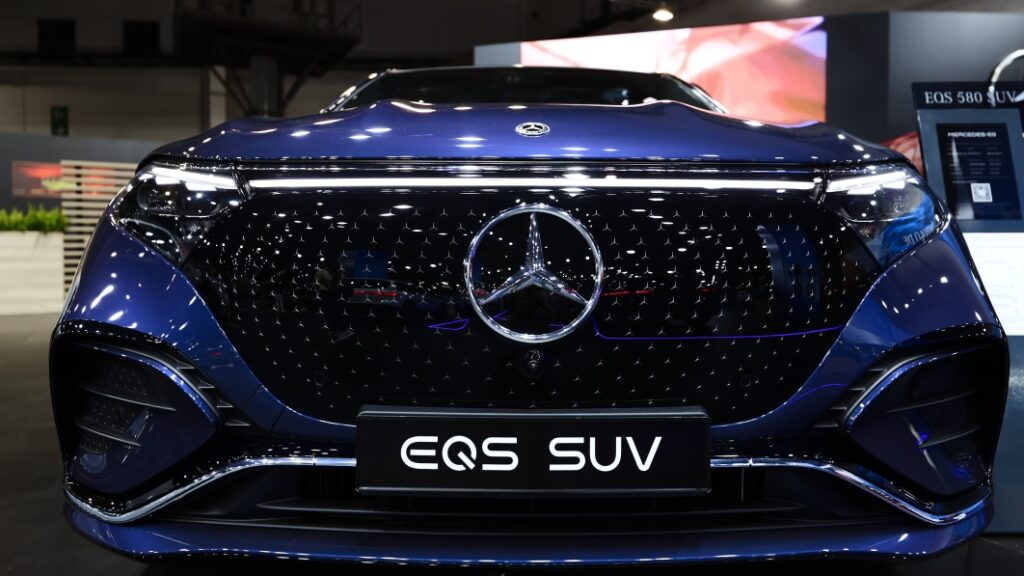Tesla Is lapping Germany’s automakers in the global EV race

Germany’s automakers announced bold plans the past few years to shift to electric cars and challenge Tesla Inc.’s dominance. Instead, they’re only falling further behind.
Tesla delivered almost 890,000 cars in the first half of this year, more electric vehicles than Volkswagen AG, BMW AG, Mercedes-Benz Group AG and Porsche AG combined.
The Germans are struggling as software issues delay key models and contribute to waning sales in China, their biggest market, where Tesla and local champion BYD Co. have raced ahead. They’re even playing second fiddle in their home market, where Tesla remains the top EV brand. Investors will hear from three of the German companies this week, with Porsche reporting quarterly earnings Wednesday, followed by Mercedes and VW on Thursday.
As Tesla pushes for more volume with aggressive price cuts, it’s dialing up the pressure on legacy manufacturers that are struggling to keep pace. Tesla’s EV sales increased 30 percentage points more than VW’s in the three months that ended in June, widening its lead.
While the Germans are mired in difficult talks with unions about retooling their combustion-era production sites, Tesla plans to expand its German factory and is preparing to build a new plant in Mexico.
“Tesla is still miles ahead of the German carmakers in all the major markets,” said Matthias Schmidt, an auto analyst based near Hamburg. “They’re under pressure to boost volumes to reach the kind of economies of scale needed to make EVs profitable.”
Tesla shares, which have more than doubled this year, declined before the start of U.S. trading on Monday after UBS cut its rating on the stock to the equivalent of hold.
Germany’s automakers thrived in the past because they perfected the production of vehicles running on gasoline and diesel, with hundreds of high-quality local parts makers supplying them with gearboxes, fuel injectors and crankshafts. Now that the battery is taking over, their “Vorsprung durch Technik” has evaporated.
In Europe’s biggest economy, inflationary pressures, a dearth of skilled workers and high energy prices are adding to the structural challenges posed by the EV shift. German automakers’ expectations are at their worst since the 2008 financial crisis, according to a survey the Munich-based Ifo Institute published this month.
The Germans’ biggest threat is their weakening position in China. VW, BMW and Mercedes dominated combustion-car sales in the world’s biggest auto market for decades, but recently have fallen behind Chinese brands that have been better at churning out affordable EVs with technology and software geared to local tastes. Mercedes slashed prices in China for its flagship electric sedan, the EQS, late last year after disappointing sales.
VW, in particular, has come under pressure, with BYD outselling the company in China during the first quarter. The German manufacturer’s EV sales in China dipped in the first half in a market that grew 20%.
EVs are expected to make up 90% of the Chinese market by 2030, adding urgency for the Germans to accelerate more competitive EV offerings. Europe’s biggest automaker last month replaced the CEO of Audi partly because it wants to halt the brand’s slide in the country.
The current EV leaders in China “will tighten their grip on the market,” analysts from HSBC said in a report this month. “With the exception of Tesla, we think they will all be China EV brands.”
All is not lost. Elon Musk has left open a window of opportunity for incumbents looking to catch up, having launched his last new passenger vehicle — the Model Y — in 2020. Tesla hasn’t redesigned the Model 3 since it went into production six years ago, though work on a refresh is underway.
BYD meanwhile is steering clear of the U.S. market because of trade barriers, and several smaller Chinese EV startups may not survive the industry’s price war.
The German companies still generate healthy profits selling combustion-engine models, including in China. Mercedes and BMW aren’t following Tesla out of premium price segments and are still roughly doubling EV sales, year-over-year. Plans by the Germans to introduce EV-focused platforms around the middle of the decade to lower the cost of their electric cars and equip them with new technology could alter the dynamic.
VW is readying a compact EV priced at less than €25,000 — a people’s car for the electric age — that’s a couple of years away from production. Europe’s largest carmaker recently bolstered its rolling five-year spending plan to €180 billion, with more than two-thirds going to software and EVs. Its ID.7 sedan that will hit showrooms later this year comes with an augmented-reality display that beams information into the driver’s field of vision.
Mercedes will introduce an electric version of its compact CLA sedan in the US next year to better compete with Tesla’s Model 3, according to an Automotive News report. It’s also electrifying the iconic G-Wagon.
BMW is betting that its “Neue Klasse” underpinnings, due to arrive around 2025, will help accelerate sales. The manufacturer aims to cut battery costs by half and increase range and charging speed 30% compared to current models.
“The next-generation EV platforms from the Germans could change things,” said Bloomberg Intelligence analyst Michael Dean. “That’s when you’ll see a big push from them, also in China.”







